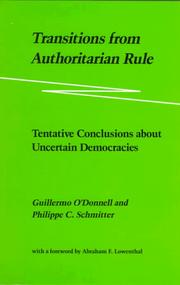| Listing 1 - 10 of 20 | << page >> |
Sort by
|
Book
ISBN: 9780415669191 9780415669207 9780203155196 9781136579912 9781136579950 9781136579967 0415669197 0415669200 Year: 2012 Publisher: London Routledge
Abstract | Keywords | Export | Availability | Bookmark
 Loading...
Loading...Choose an application
- Reference Manager
- EndNote
- RefWorks (Direct export to RefWorks)
In the face of increasing political disenchantment, many Western governments have experimented, with innovations which aim to enhance the working and quality of democracy as well as increasing citizens' political awareness and understanding of political matters. This text is the most comprehensive account of these various democratic innovations. Written by an outstanding team of international experts it examines the theories behind these democratic innovations, how they have worked in practice and evaluates their success or failure. It explains experiments with new forms of democratic engagement such as: Direct Democracy Deliberative Democracy Co-Governance E-Democracy Drawing on a wide variety of theoretical perspectives and with a broad range of case studies, this is essential reading for all students of democratic theory and all those with an interest in how we might revitalise democracy and increase citizen involvement in the political process.

ISBN: 9077596046 9789077596043 Year: 2005 Publisher: Utrecht : Eleven,
Abstract | Keywords | Export | Availability | Bookmark
 Loading...
Loading...Choose an application
- Reference Manager
- EndNote
- RefWorks (Direct export to RefWorks)
Democracy --- Constitutional law. --- Government, Resistance to --- Prevention --- 213 Democratie --- Démocratie --- Philosophy --- Philosophie --- Democracy - Case studies. --- Government, Resistance to - Prevention
Book
ISBN: 9781137357809 1137357800 Year: 2014 Publisher: New York ; Basingstoke Palgrave Macmillan
Abstract | Keywords | Export | Availability | Bookmark
 Loading...
Loading...Choose an application
- Reference Manager
- EndNote
- RefWorks (Direct export to RefWorks)
"What does a deliberative democracy look like in a divided society ? What obstacles and opportunities are there for the promotion of a deliberative democracy at the institutional and citizen levels ? Through case-analysis and cross-sectional assessment of nine countries, this unique and important collection provides a detailed and insightful exploration into these problematic questions. A roll call of leading experts on deliberative democracy explores some of the most deeply divided societies in the world today, ranging from Northern Ireland to Nigeria and Belgium to the Basque Country, specifying conditions under which deliberative democracies could realistically emerge in unpropitious contexts. This collection is recommended reading for students and scholars of deliberative democracy and of politics in divided societies"--

ISBN: 0801826829 9780801826825 Year: 1986 Publisher: Baltimore (Md.): Johns Hopkins University press,
Abstract | Keywords | Export | Availability | Bookmark
 Loading...
Loading...Choose an application
- Reference Manager
- EndNote
- RefWorks (Direct export to RefWorks)
Book
ISBN: 9780199572106 9780199604432 0199572100 0199604436 Year: 2011 Publisher: Oxford Oxford University Press
Abstract | Keywords | Export | Availability | Bookmark
 Loading...
Loading...Choose an application
- Reference Manager
- EndNote
- RefWorks (Direct export to RefWorks)
All over the world democratic reforms have brought power to the people - but under conditions where the people have little opportunity to think about the power that they exercise. Do we want a democracy inspired by Madison or by Madison Avenue? A democracy animated by deliberation or by manipulation? This book examines each of the principal democratic theories and makes the case for a democracy in which the people offer informed judgments about politics or policy. It then goes on to show how this form of democracy can be made a reality. When the People Speak describes deliberative democracy projects conducted by the author with various collaborators in the US, China, Britain, Denmark, Australia, Italy, Bulgaria, Northern Ireland, and in the entire European Union. These projects have resulted in the massive expansion of wind power in Texas, the building of sewage treatment plants in China, the crafting of budget solutions in a region in Italy, and greater mutual understanding between Catholics and Protestants in Northern Ireland. Critics of deliberative democracy say that it will privilege the more educated or that the public is incompetent when it comes to understanding policy issues, and should not be consulted. Others argue that it will increase polarization. Fishkin offers rebuttals for each of these arguments. Combining theory and practice he shows how a more deliberative politics is both practical and compelling.

ISBN: 0801831903 9780801831904 Year: 1986 Publisher: Baltimore, Md Johns Hopkins University Press
Abstract | Keywords | Export | Availability | Bookmark
 Loading...
Loading...Choose an application
- Reference Manager
- EndNote
- RefWorks (Direct export to RefWorks)
Book
ISBN: 080183192X 9780801831928 Year: 1988 Publisher: Baltimore (Md.): Johns Hopkins press,
Abstract | Keywords | Export | Availability | Bookmark
 Loading...
Loading...Choose an application
- Reference Manager
- EndNote
- RefWorks (Direct export to RefWorks)
Political systems --- Latin America --- Representative government and representation --- Authoritarianism --- Democracy --- Case studies --- Representative government and representation - Latin America - Case studies --- Authoritarianism - Latin America - Case studies --- Democracy - Case studies
Book
ISBN: 9780415690997 9780203157244 9781138811645 9781136584862 9781136584909 9781136584916 1138811645 0203157249 0415690994 Year: 2014 Publisher: London Routledge, Taylor & Francis Group
Abstract | Keywords | Export | Availability | Bookmark
 Loading...
Loading...Choose an application
- Reference Manager
- EndNote
- RefWorks (Direct export to RefWorks)
Political systems --- Federal government. --- Cultural pluralism. --- Federal government --- Cultural pluralism --- Democracy --- Federal government - Case studies. --- Cultural pluralism - Case studies. --- Democracy - Case studies.
Book
ISBN: 9782913492769 2913492762 Year: 2010 Publisher: Gap: Yves Michel,
Abstract | Keywords | Export | Availability | Bookmark
 Loading...
Loading...Choose an application
- Reference Manager
- EndNote
- RefWorks (Direct export to RefWorks)
La démocratie participative, dont les racines sont anciennes, connaît un renouveau retentissant depuis une dizaine d'années. Elle semble s'institutionnaliser dans la durée, dans une dynamique qui se différencie du caractère contestataire des mouvements sociaux des années 60 et 70. Cet ouvrage analyse ses dynamiques de diffusion, le succès particulier de certains dispositifs, les aléas de tel ou tel parcours, la multiplicité des expériences locales et l'inachèvement général d'un processus qui semble, pourtant, porté par des tendances lourdes. Comment expliquer, par exemple, la grande diversité des budgets participatifs, en Europe mais aussi à l'intérieur d'un même pays ? Pourquoi le recours au tirage au sort s'est-il d'abord répandu en Allemagne, en Grande-Bretagne et en Espagne, puis plus tardivement en France ? Comment comprendre le fait que, malgré les succès des expériences qui ont recours à cette procédure, celle-ci ne soit pas encore devenue une composante standardisée du fonctionnement démocratique ? Pourquoi une telle diversité des dispositifs participatifs liés aux enjeux urbains ? Pour favoriser une meilleure compréhension de ces phénomènes, l'accent est ici mis sur deux aspects peu étudiés jusque-là dans une optique comparative : l'évolution dans le temps et la place des acteurs, individuels ou en réseau. À travers quels réseaux d'acteurs, quelles institutions, se sont opérés des transferts ? Retracer cette généalogie de la démocratie participative permet de mieux en comprendre la portée et les limites. Et donne des clés à ceux qui veulent la faire vivre aujourd'hui.
Democracy --- Regional planning --- City planning --- Community development --- Urban policy --- Political participation --- Démocratie --- Aménagement du territoire --- Urbanisme --- Développement communautaire --- Politique urbaine --- Participation politique --- Citizen participation --- Participation des citoyens --- --Deliberative democracy --- Local government --- Political science - Democracy --- Démocratie --- Aménagement du territoire --- Développement communautaire --- Citizen participation. --- Deliberative democracy - Case studies --- Political participation - Case studies --- Local government - Citizen participation - Case studies --- Democracy - Case studies --- Deliberative democracy

ISBN: 0801831881 1421410206 9780801831881 Year: 1986 Publisher: Baltimore, Md Johns Hopkins University Press
Abstract | Keywords | Export | Availability | Bookmark
 Loading...
Loading...Choose an application
- Reference Manager
- EndNote
- RefWorks (Direct export to RefWorks)
Representative government and representation --- Democracy --- Authoritarianism --- Case studies --- Autoritarisme --- Political systems --- Latin America --- Gouvernement représentatif --- Démocratie --- Case studies. --- Cas, Etudes de --- Representative government and representation - Latin America --- Democracy - Case studies --- Authoritarianism - Latin America - Case studies
| Listing 1 - 10 of 20 | << page >> |
Sort by
|

 Search
Search Feedback
Feedback About UniCat
About UniCat  Help
Help News
News